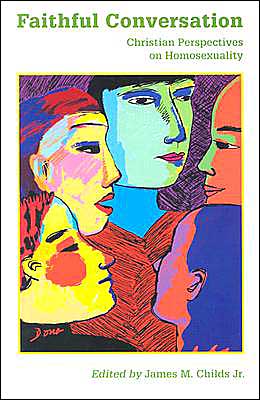Book Notes
 James Childs, editor, Faithful Conversation; Christian Perspectives on Homosexuality (Minneapolis: Fortress Press, 2003), 132pp.
James Childs, editor, Faithful Conversation; Christian Perspectives on Homosexuality (Minneapolis: Fortress Press, 2003), 132pp.
Like almost every major denomination, the Evangelical Lutheran Church of America has struggled over the last years with forming a theology and eventually a policy over homosexuality and attendant issues like ordination and gay marriages. Currently the denomination welcomes gays as full church members, but does not admit practicing homosexuals to ordained ministry, nor is there any provision to bless same-sex "marriages." To help the denomination, presidents at eight of the ELCA seminaries commissioned this volume. The five chapters are written by five different Lutheran seminary professors and treat, in turn, Scripture, the Lutheran tradition, culture, science, and human experience.
One of the vexing aspects of this issue is that for most people it is a matter of conscience, and as Childs points out in his introduction, it was Luther's genius to encourage believers to obey their consciences, even though we readily admit that conscience can err, as long as we do our best to let Scripture form and bind our conscience. Another key distinction is whether the issue of homosexuality and the church is an essential article of faith, or "merely" a moral judgment about something that, however important, is not an essential of faith and about which we should agree to disagree (much like, for example, other hotly contested matters like divorce, abortion, war or the death penalty). Although all seven texts of Scripture are unambiguously negative about homosexuality, the question arises whether some circumstances would permit exceptions, perhaps unavoidable, or the lesser evil of several less than ideal choices. For example, we rightly think of murder, theft or divorce as always wrong, but sometimes extenuating circumstances qualify our judgment. I especially enjoyed the discussions in this book about celibacy. There are big differences between voluntarily choosing celibacy, trying to get married but being unsuccessful, and being required by others to repress your sexuality and remain celibate. Most of the authors draw attention to our over sexualized culture which, sadly, makes sex a commodity to which people feel entitled, a thought any sensitive Christian should reject. Finally, I had never thought about legal ramifications for denominations, and here there is a bitter irony. The last decades have witnessed far greater leniency in our culture at large regarding sex, but for religious denominations legal oversight has grown far stricter due to clergy abuse. Background checks of prospective clergy are now routine. So, writes Nestingen, "gays and lesbians seeking to practice their homosexuality while serving as clergy must be willing to provide a public accounting of their sexual relationships," just as heterosexual couples must. For their part, a denomination must "decide whether it is willing to assume with homosexuals the legal and financial responsibility that the law has already imposed [emphasis mine] on it for monitoring the sexual practices of heterosexual clergy" (p. 56).


